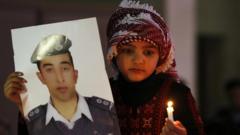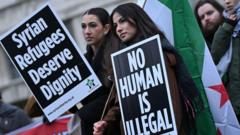Following the overthrow of Bashar al-Assad, Islamist rebels have established a structured administration in Syria's Idlib Province, taxing local producers and exerting economic control, though challenges remain.**
Evolving Authority: How Rebels are Shaping Post-Assad Syria**

Evolving Authority: How Rebels are Shaping Post-Assad Syria**
Islamist factions now oversee governance in formerly opposition-held territories, revealing the complex dynamics of rebellion and administration.**
In the aftermath of the sweeping defeat of Bashar al-Assad’s regime, the landscape of northern Syria, particularly Idlib Province, has transformed under the governance of Islamist rebel factions like Hayat Tahrir al-Sham. These groups, who have maintained a firm grip on the region since 2017, are proving to be not only military contenders but also adept civil administrators.
During the annual olive harvest in Idlib, local farmers often encounter representatives from the tax authority, who collect a mandatory 5% of their produce, leaving many locals dissatisfied yet resigned to the established order. These measures, along with other regulations implemented by the Syrian Salvation Government, have sparked protests and sporadic violence, as residents grapple with both the pressures of governance and their own socio-economic realities.
The authority established by these rebels has demonstrated surprising resilience. In addition to the olive oil tax introduced in 2019, they have expanded their financial base by taxing goods, generating income from fuel sales, and establishing a telecommunications company. This organizational strategy closely mirrors that of a traditional government, showcasing their capacity to manage resources while simultaneously bolstering military capabilities and providing essential civil services.
As analysts observe these developments, it becomes clear that the governance models applied in Idlib offer valuable insights into how power dynamics could evolve in a nation emergent from decades of dictatorship. Interviews with local experts, humanitarian representatives, and community members illustrate a nuanced landscape where governance by former insurgents might be redefining statehood in post-Assad Syria.






















